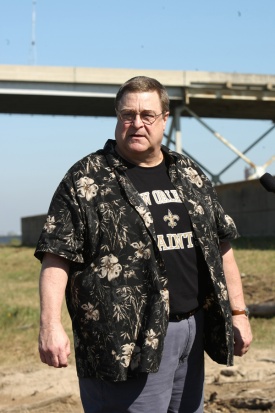[SPOILER ALERT] I’ve resisted saying too much about Treme on a week-to-week basis because the series has felt like the season adds up to a novelistic whole, and commenting on parts is like trying to talk about a book when you’re a third or halfway through. It has its own pace, and though it may not be as swift as some shows, recall the early episodes then check Karen Dalton Beninato’s recap and tell me nothing happened.
 Every episode is a sort of Norton Critical Edition, with the footnotes coming online courtesy of countless bloggers and The Times-Picayune‘s Dave Walker. I still wonder – is the city really that inexplicable? Are the reams of notes necessary? Was The Wire as referential to Baltimore as Treme is to New Orleans, and we just didn’t realize it because the additional knowledge wasn’t necessary to enjoy the show?
Every episode is a sort of Norton Critical Edition, with the footnotes coming online courtesy of countless bloggers and The Times-Picayune‘s Dave Walker. I still wonder – is the city really that inexplicable? Are the reams of notes necessary? Was The Wire as referential to Baltimore as Treme is to New Orleans, and we just didn’t realize it because the additional knowledge wasn’t necessary to enjoy the show?
Still, the notes clearly add to the Treme experience, though there’s a danger in them as they suggest a more stable mapping between the show and the lives we led than is safe. Much has been made of the late Ashley Morris as a “muse” – David Simon and Eric Overmyer’s word – for John Goodman’s Creighton Burnette; only after this week’s episode did people start talking about the late filmmaker Stevenson Palfi.
Along with the footnotes has come numerous blogposts that comment, make connections and riff with the show as the launching point, working to more fully understand Treme, its themes, its tension, and their relationship to the city we live in. I regularly read Sound of Treme by Los Po-Boy-Citos’ guitarist Matt Sakakeeny and Back of Town, which is written a number of bloggers, many of whom were in town and blogging during the time period covered. The most recent post, “Houdini” by ali, uses her own experiences to help understand the characters, the drama, and the way we dealt with life after Katrina, and the merger of the personal, the fictional and the social gives the post power and resonance.
Early on, writer and former OffBeat food editor Todd Price wondered if would be possible for anyone from here to accurately critique Treme, and he’s probably right. We’re all likely too close to the story and have our own axes to grind, our own senses of what was essential, of what one thing people outside of New Orleans need to know to understand our lives during that time. As Andrei Codrescu said in 2008:
We talk about Katrina as a founding event, something that is a point in our history where everything changed. We talk about before the war and after the war; we talk about before Katrina and after Katrina We talk about it as freshly wounded veterans, and we’re working on remaking ourselves.
Seeing Treme and chewing on it – measuring it up to the documentable past and the past we remember – is part of the process of remaking ourselves.
– Alex Rawls




